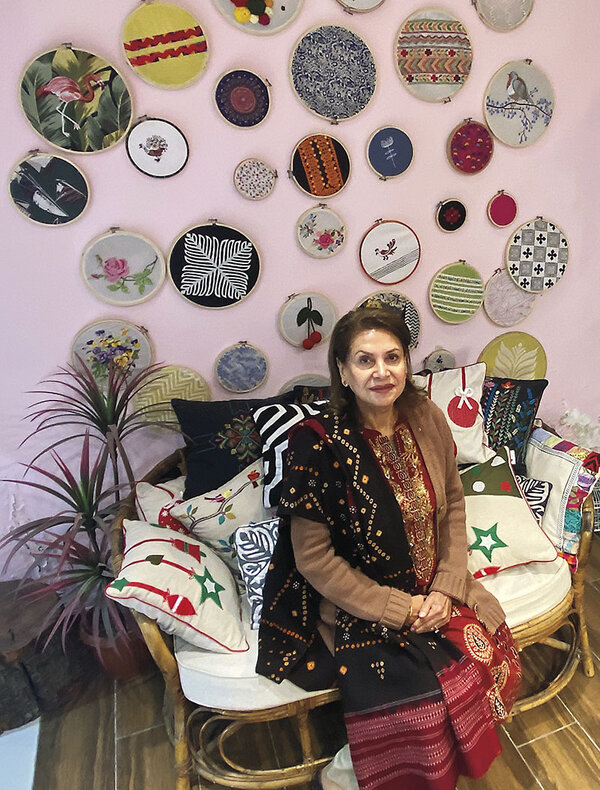Pakistani women stitch a new future for themselves while shattering barriers
Loading...
| Rawalpindi, Pakistan
In an industrial workroom in the heart of Rawalpindi, Nasreen Aziz is busy embroidering a pattern on a piece of fabric. A mother of four, Mrs. Aziz first came to work at the Behbud Association of Pakistan in 2001 when it became clear that her husband was struggling to provide for their family. Though she had always been interested in needlework, it was here that she honed her skills and received training to make clothes to a professional standard.
“When a woman starts earning, people start to respect her,” Mrs. Aziz says. “It makes her stronger, and her in-laws start to look at her differently.”
The Behbud Association of Pakistan was created in the aftermath of the deadly 1965 war between India and Pakistan that left thousands of women without husbands. A group of volunteers started a vocational training program out of a small garage in Rawalpindi, where war widows who had no other source of income were taught to sew and embroider so that they could earn money to lift themselves out of destitution.
Why We Wrote This
A story focused onPakistan is a challenging environment for female workers. Women employed by the Behbud Association are making inroads in the paid workforce while also supporting their families.
Nearly 60 years later, Behbud has expanded into a nationwide operation with offices in all major cities of Pakistan as well as skill centers dotted across the country in rural areas. As part of Behbud’s open-door policy, women of varying skill levels are encouraged to visit their nearest skill centers, where their work is assessed by a team of experts.
“Some of these workers know absolutely nothing,” says Taslim Akhtar, a soft-spoken skill trainer employed by Behbud. “With these women, we make them repeat the work again and again until they reach the necessary standard.”
No one is turned away for lack of skill.
“Our motto is, when a woman comes to us looking for work, we never say no,” says Abida Malik, the association’s long-serving female president. “We have already lifted 1.6 million women out of poverty ... and we’re still doing it.”
“They do good work”
Once trained, women receive bundles for sewing and embroidering to take home from the Rawalpindi facility, which uses the services of more than 1,500 women on an ad hoc basis.
Behbud “provides paid work for women who are destitute or poor or alone looking after families,” says women’s rights activist Khawar Mumtaz, who was the chairperson of the National Commission on the Status of Women from 2013 to 2019. “They do good work; they teach them skills but also pay them, and the women are always very grateful.”
To sustain itself, Behbud sells the clothes and handicrafts the women produce; its expansion into a nationwide nonprofit over the past few decades also allows it to focus on preserving more regional forms of artisanship. These include the Sindh region’s traditional Ajrak block-printing style and the Punjab region’s floral embellishment, called Phulkaari. Behbud is now as much of a fashion brand as it is a social enterprise, with boutiques in the large cities of Islamabad and Lahore and a capacity to ship online orders nationwide.
Despite the successes of Behbud, Pakistan remains a challenging environment for women who want to work. According to the World Economic Forum’s Global Gender Gap Index, Pakistan is second from the bottom in the “economic participation and opportunity” metric, with less than 25% of women active in the workforce.
Making their place in the world
Living in patriarchal communities with rigid expectations of femininity, many Pakistani women are prohibited from entering the workforce for fear that they will have to interact with men. In many cases, the idea of a woman going out to work is also perceived as an indictment of the earning potential of the men in her family, who are expected to be breadwinners. But with an economy marred by low growth and high inflation, these barriers are beginning to shatter out of necessity.
Ms. Malik says it is not uncommon for women to approach her and ask if they can work at Behbud secretly. In such instances, the association’s policy is to invite the husbands and fathers of the women to visit Behbud’s local skill center or production facility to judge the work environment for themselves. By contributing to the expenses of running the household, many women have been able to conquer the resistance of their families.
“It’s all about economics,” says Ms. Malik.
There is also a sense that by becoming financially independent, the women are empowered to demand their rights. Kishwar Naheed, who came to Behbud as a 16-year-old in 1993, says that it was because of the values she learned while working at the organization that she was able to successfully litigate her divorce.
“Look, my life would have been carrying on even without Behbud, but it would have been much worse,” she says. “It was here that I learned how to stand up for myself and how to make a place for myself in the world.”
As part of its holistic approach toward female empowerment, Behbud is committed to providing education and health care facilities to Pakistan’s most marginalized women. Besides running eight schools teaching children math, English, and other subjects, Behbud is upgrading its maternal and children’s clinic in Rawalpindi into a full-fledged hospital.
That facility, once complete, will provide a range of services with a commitment to treating 75% of patients for free.
Beyond that, the plan for Behbud, according to Ms. Malik, is to grow it into a global nonprofit. “If you are determined, you can get anything done,” she says, pointing to the women around her who are sewing and embroidering as proof.






